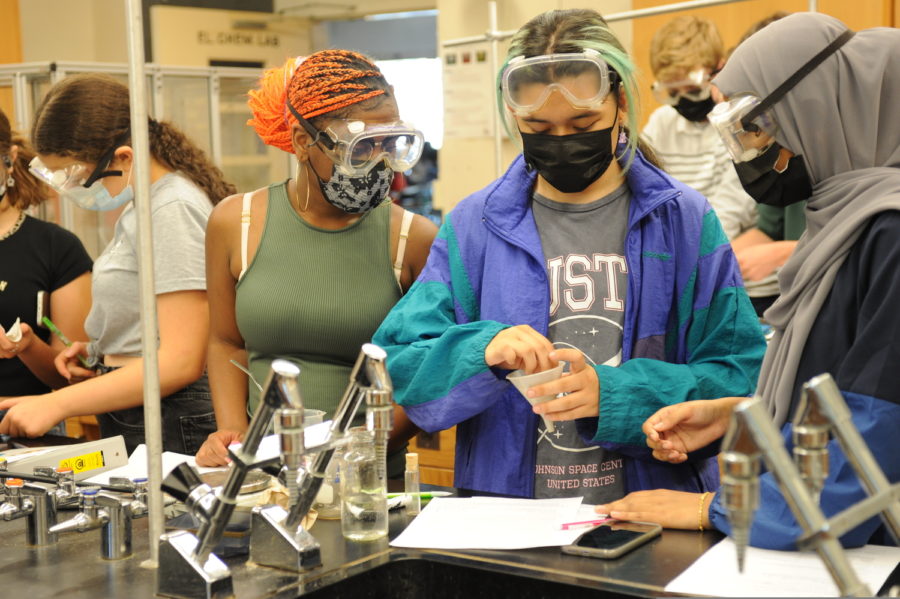The Background Behind the Nobel Prizes
While everyone may know about the Nobel Prize Awards, you may not know about how winners are selected.
Could one of these Bronx Science students become a future Nobel prizewinner? The Bronx High School of Science counts eight Nobel Prize recipients as graduates.
We’ve just had another round of Nobel Prize announcements in 2021, for “achievements that have conferred the greatest benefit to humankind.” Members of the news media gushed over the accomplishments of the laureates — in the fields of physics, chemistry, medicine, economics, literature, and world peace.
While most of us can name one or two Nobel laureates, how many of us can definitively say how they are awarded and what the criteria is?
One guess came from Ali Hamlani ’23 who said, “Maybe there is some bias involved.” And in some ways, he isn’t that far off.

The Nobel Prizes are named after a Swedish chemist, Alfred Nobel, who made his fortune inventing dynamite and donated his wealth to establish a prize for exceptional achievements that benefit humanity when he passed away. The Nobel Foundation oversees the process, with the Royal Swedish Academy of Sciences being in charge of each individual science and economics prize, and the Norwegian committee being in charge of the peace prize.
The nomination process begins a year in advance, in September. Each prize committee sends out requests to select universities, scientific academies, previous laureates and researchers for nominations. It takes a year in order to evaluate the nominees, narrow down the list, and then make the final announcement.
One basic rule is that no one can nominate themselves, and the names of the nominees are kept secret for 50 years. The achievements have to be peer-verified and become established science, usually with clear practical applications. This process means it takes years or decades for a scientist’s work to be honored. Sir Roger Penrose was awarded a Nobel in 2020 for work he did in the 1960s on black holes. For theoretical physicists like Stephen Hawking, whose predictions and models are far ahead of the technology necessary to verify them, the chances of winning a Nobel become slim. In Hawking’s case, predictions he made about black holes and their characteristics were only verified after his death by scientists using a new laser observatory.
That leads to another quirk of the prizes — they are only awarded to living people and there is no posthumous award. So although Hawking’s theories about black holes are considered fundamental to the understanding of how the universe works, the Nobel committee will not be able to give him an award. However, the head of the team that built the LIGO observatory and used it to study black holes and verify Hawking’s theory has won a Nobel.
Nobels don’t often go to mere inventions, however revolutionary they may be. Thomas Edison never won a Nobel, nor did anyone get a Nobel in connection with the development of the world wide web. Also, comparatively few women have been awarded Nobels, only 58 since 1901. Of these winners, a disproportionate number were in the Nobel Peace and Literature categories.
More Nobel trivia: The Curies, of x-ray fame, have the most Nobels of a family – five in total. Marie Curie won twice, in Physics and Chemistry, while her husband was a co-awardee and later her daughter and her son-in-law won, too.
Many of you are familiar with the youngest winner: Malala Yousafzai, the Pakistani education activist, who won the Peace Prize at the age of 17 in 2014, for her fearless advocacy.

Even Bronx Science has its own corner of Nobel fame. Seven of our alumni have won the Physics prize, and one was awarded the Chemistry prize. But it has been a while – the last win in 2012, a Nobel Prize in Chemistry, went to a graduate from the class of 1966, Robert Lefkowitz. Who knows, maybe there is someone in our cohort who might win one — four to five decades from now.
One basic rule is that no one can nominate themselves, and the names of the nominees are kept secret for 50 years.
Saamiya Ahmed is an Editor-in-Chief for ‘The Science Survey.’ They see journalism as a way to educate others and to help brighten readers’ days with...
Wendy Lin is an Academics Section Editor for ‘The Observatory’ yearbook. She fell in love with photography in sixth grade after taking her very first...











